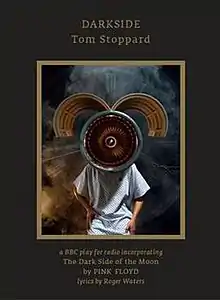Darkside (radio play)
Darkside is a 2013 philosophical comedy radio drama written by Tom Stoppard, produced and directed by James Robinson and based on the themes of Pink Floyd's 1973 progressive rock album The Dark Side of the Moon.
| Darkside | |
|---|---|
 Darkside CD cover | |
| Written by | Tom Stoppard |
| Date premiered | 26 August 2013 |
| Original language | English |
Cast
- Amaka Okafor as Emily McCoy
- Iwan Rheon as The Boy
- Bill Nighy as Doctor Antrobus / The Witch Finder
- Rufus Sewell as Mr Baggott / Ethics Man
- Adrian Scarborough as Fat Man
- Peter Marinker as The Wise One
- Robert Blythe as Banker
- Ben Crowe as Politician
- Philippa Stanton as Emily's Mother
Production
Stoppard was first approached with the idea of writing a play based on the album in 1973, but had "no idea" how to approach it until much later.[1] BBC's radio drama producer James Robinson said that the initial idea was "to see what sort of a journey the album takes Tom Stoppard on." Stoppard used all of the album, apart from lyrics, as "a kind of underscore", taking emotional cues from the music. He contacted Pink Floyd's David Gilmour, who gave Stoppard permission to write dialogue that would be heard over the instrumental pieces, and found the resulting script "fascinating".[1] On adapting the album, Stoppard stated: "I didn't try to make a story that was the album writ large in any way. I invented a little story in the spirit of the album, taking a cue as to what level of reality this story might be on."[2]
Themes
The following philosophical themes are present in the play:[3]
- The trolley problem, a traditional thought experiment
- The tragedy of the commons
- Utilitarianism
- Utilitarian consequentialism
- Nietzscheanism
- Nietzschean egoism
- Kantianism
- Hobbesianism
- The prisoner's dilemma, a traditional example analyzed in game theory
Marketing
Aardman Animations created a three-minute short film to promote the play, consisting of a montage depicting a world on the verge of collapse, with huge ploughs destroying landscapes and skies filled with warplanes.[2] The short was directed by Darren Dubicki, and was intended to evoke themes of "greed, conflict and consumption" with the eventual message that "Life is futile, and destined to descend into madness." The animators drew inspiration from the surreal album artwork by Storm Thorgerson and Hipgnosis.[4]
Broadcast
The play was broadcast on BBC Radio 2 on 26 August 2013, the year of the album's 40th anniversary. It was preceded by a number of programmes to complement the event.[1] During the broadcast, Aardman Animations' short film was played in a loop on the BBC Radio 2 website, BBC Big Screens and several third-party sites.[5] The first online review of the play was by Robin Hilton.[6] The play is now available on Deezer and Spotify.[7]
References
- "Pink Floyd album inspires Sir Tom Stoppard radio play". BBC. 28 March 2013. Retrieved 24 August 2013.
- "Aardman animates trailer to Radio 2 Pink Floyd play". BBC. 20 August 2013. Retrieved 24 August 2013.
- "Tom Stoppard's Daring 'Dark Side Of The Moon' Makeover". NPR.org. Retrieved 27 January 2017.
- Amidi, Amid (20 August 2013). "Aardman Animates Pink Floyd's Dark Side of the Moon". Cartoon Brew. Retrieved 24 August 2013.
- "Aardman creates film based on a Stoppard play to celebrate 40th anniversary of Dark Side of the Moon". creativity-online.com. 20 August 2013. Retrieved 24 August 2013.
- Tom Stoppard's Daring Dark Side Of The Moon Makeover
- "Darkside, Tom Stoppard incorporating The Dark Side of The Moon by Pink Floyd". Spotify. 22 November 2013.